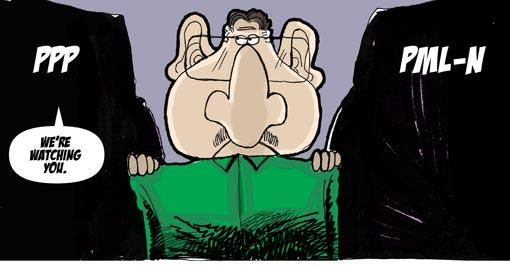For several weeks there was no mistaking the mood of the people of Pakistan but most analysts were apprehensive that widespread apathy and loss of faith in the electoral process might prevent them from expressing it proactively on the actual day of elections.
Benazir Bhutto's assassination, murderous bombing of two gatherings of the Awami National Party (ANP) in the North Western Province, daily warnings from the government that principal political personalities were targets of terrorists and a general perception that the government was determined to rig the polls anyway made the election campaign just about the most lacklustre one in Pakistan's history.
On February 18, the people completely outwitted the government as well as the pundits who had forecast a less than robust electoral verdict. The morning papers carried an ill-advised statement made by President Pervez Musharraf to a foreign correspondent that his Pakistan Muslim League (PML-Q), the party he, according to his own autobiography, had cobbled together to provide a political transition from his initial military regime, would easily win a decisive majority. The voters read it all and went merrily to the polling booths all over the country to do exactly the opposite.
Power brokers
As many as 23 ministers of Musharraf's hand-picked Cabinet, most of them veteran power brokers of Pakistan's famous Establishment, lost to challengers from Bhutto's Peoples Party (PPP) or Nawaz Sharif's Pakistan Muslim League (PML-N). Simultaneously, the voters punished those religious parties that had played a big role in legitimising Musharraf's military putsch of October 1999 and his subsequent reconstitution of the country's constitution. The PPP bagged 87 seats and PML-N 66 seats while PML (Q) - pejoratively dubbed as the King's Party - slumped to 47 seats in the contest for 272 seats.
An electoral upset of this magnitude happens only when several factors find an unexpected synergy. But it is difficult to escape the judgement that the voters were basically manifesting their strong opposition to Musharraf and his main loyalists. Pakistan's Election 2008 became a measure of the staggering loss of popularity and trust that Musharraf has suffered during the last one year.
In the Pakistani system, the 342-strong National Assembly would be constituted by adding to the directly elected members a party-proportionate number of women and representatives of minorities to the seats reserved for them. This lower house of parliament elects the prime minister. Pakistan now needs the kind of coalition-building that has been the hallmark of Indian democracy for quite some time and which is frequently seen in European parliaments.
The difference lies in the highly vexed Musharraf factor. It would simply not be there if he had been a non-partisan head of state. Now the political spectrum is notably divided. Forces led by PML(N) forcefully argue that the logical next step is for him to step down. The PPP has a nuanced ambiguity and would probably like to negotiate with him measures that strengthen the parliament and re-adjust powers of the president and prime minister so as to bring the constitution closer to its original parliamentary form. PML (Q) and MQM, a party that draws its support mainly from migrants from India who settled in Karachi and other urban centres of Sindh, clearly want Musharraf to continue as a strong president. PML (N) insists on the restoration of the judges, a step that Musharraf completely rules out. The popular verdict would indicate a strong and stable coalition comprising the PPP, PML (N) and ANP, which incidentally has a clear majority in the troubled NWFP. This would essentially be an alliance of moderate forces that the west should really be happy about in the context of the war on terror and the deteriorating situation in Afghanistan.
Despite the euphoria produced by the election, it is difficult to claim that Pakistan's political crisis is about to end. In fact, the danger is that if negotiations between the two principal parties, namely the PPP and PML (N), get bogged down on issues which directly or indirectly impinge on Musharraf's survival as the president of the republic this crisis may worsen. The parties may not even be able to discuss coalition-building in a tranquil atmosphere as the lawyers agitating for the restoration of deposed judges as well as the political parties that boycotted the elections are already threatening to launch fresh public protests.
A dramatic set of concessions by Musharraf on contentious issues can still calm the situation but he is not likely to make them unless the new parliament leaves him with no choice by refusing to indemnify the emergency and by threatening him with impeachment. In the short run, he may try to sideline Sharif. This will mean continued turmoil which he may well be prepared to risk but which will entail a high political and economic cost for the country. Pakistan will flourish if the logic of elections is respected; it will suffer if it gets pushed into yet another era of Byzantinist intrigues.
Tanvir Ahmad Khan is a former ambassador and foreign secretary of Pakistan.









